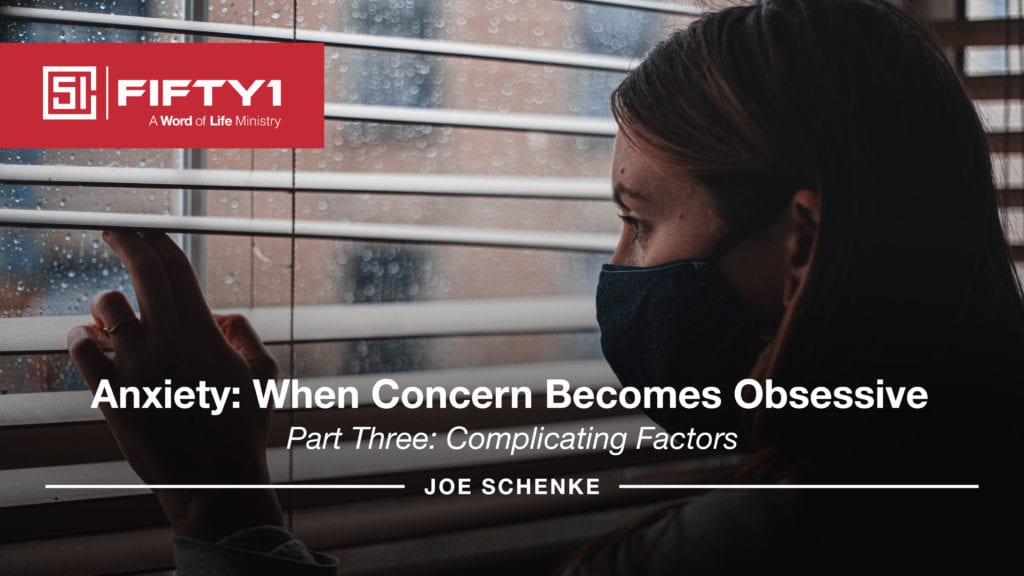Part Three: Complicating Factors
Where one runs to–or where one finds relief for anxiety–often reveals the allegiance of one’s heart. Anxiety doesn’t feel good, and it’s often felt physically through a racing heart, sweaty hands, or a pounding migraine. When our anxiety escalates, so does our impatience–because whenever we experience something uncomfortable, we want to get rid of it as quickly as possible. Anxiety often prompts us to run away from something, but it doesn’t know where to run. We desperately look for escapes to ease the pain and not feel these feelings, and in the short term, anything that provides immediate relief can become a refuge.
It is at this point a person becomes susceptible to the perils of a wrong means of escape, further complicating their situation. For example, one may self-medicate their anguish by turning to alcohol (or other substances) to momentarily anesthetize their anxieties and take the edge off their insecurities. They may rationalize with a little alcohol in one’s veins, one can be suffering the sting of hurt, yet say, “I feel no pain!”[1] It seems to help one rise above one’s fears and be funnier or braver, yet in the end, after the substance wears off, it only intensifies their apprehensions.
Further still, especially when accompanied by guilt, anxiety can drive a person into isolation. I’m struck by how many people who struggle with anxiety assume they’re the only ones struggling. When one is afraid or ashamed, the natural response is to run, hide, and withdraw (e.g., “I was afraid, so I hid).[2] Sadly, one may seek refuge in habits that only reinforce feelings of isolation. For example, a common escape may be binge-watching movies or playing video games, which are not bad hobbies in and of themselves. However, these can become unhelpful refuges for the anxious who may be attempting to live in the fantasy worlds of fictional characters rather than learning how to face the difficulties in their own life.
Even when one may not be responsible for their current difficulties (e.g., the pandemic, broken relationships, feelings of insecurities, etc.), one is still responsible for handling these problems through godly means and resources. When one doesn’t respond well but instead sinfully reacts to their suffering (e.g. neglecting responsibilities, seeking wrong means of escape, complaining in self-pity, engaging in self-harm, etc.) guilt and its miseries are added to the original problem. As a result, complicating problems develop, further spiraling the intensity of their suffering. Like knots in a fishing line, these complicating problems have to each be untangled. The main problem cannot be resolved until one or more of these complicating problems have been addressed and eliminated.
How many times have we seen ourselves or watched others take refuge in the wrong things? There are so many voices vying for our attention and claiming to have what we need. But only our merciful, wise Father knows what we truly need and always with every struggle is faithful to provide a way of escape that we might be able to endure it.[3] He tells us to stop building our own place of refuge. Therefore, we must teach and model God ,as refuge, for knowing God as our refuge enables us to trust Him more. We need not fear situations or people who threaten our well-being, whether in a physical or spiritual sense. There is no situation we will ever face that is out of God’s merciful control, so the best place to be, always, is right with Him. “The name of the LORD is a fortified tower; the righteous run to it and are safe” (Proverbs 18:10).[4]
[1] Proverbs 23:35 (ESV) “They struck me,” you will say, “but I was not hurt; they beat me, but I did not feel it. When shall I awake? I must have another drink.”
[2] Genesis 3:10
[3] 1 Corinthians 10:13
[4] See also: 2 Samuel 22:2-3; Psalm 18:2; 28:7; 46:1; 59:16; 62:2,6-7; 71:3; 91:1-2; Proverbs 18:10; Isaiah 26:4; 41:10,13; Matthew 10:28; John 10:28-29; Romans 8:31-32; 1 Corinthians 10:13
Schenke is a graduate of WORD OF LIFE Bible Institute and Trinity International University in Deerfield, Illinois. He holds an MA in Biblical Studies from Baptist Bible Seminary and was in the MABC Counseling program at the MASTERS College in Santa Clarita, CA. He has been serving in counseling and pastoral ministry since 1983. Joe is a certified counselor with the Association of Certified Biblical Counselors (ACBC) and currently serves as the Director of Counseling at Word of Life. He and his wife Connie have been married 36 years and have four adult children and 8 grandchildren.

